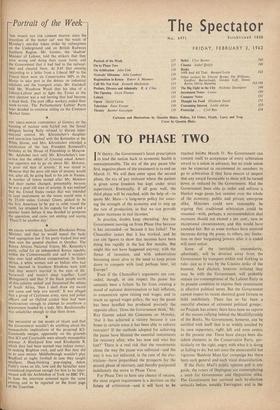—Portrait of the Week— 'THE WORST DAY FOR LONDON TRAFFIC
since the invention of the motor car' was the result of Monday's one-day token strike by railwaymen on the Underground and on British Railways Southern Region. Mr. Gunter, the 'shadow' Minister of Labour, told the strikers that they were wrong and doing their cause harm, and the Government that it had lied to the railway- men and cheated them. At 8.45 that evening (according to a letter from a Liberal MP to the Times) there were six Conservative MPs in the House to take part in the debate on industrial relations and the transport crisis. Mr. Gaitskell told Mr. Woodrow Wyatt that his idea of a Liberal-Labour pact to fight the Tories at the next election was a red herring that had become a dead duck. The post office workers ended their work-to-rule. The Parliamentary Labour Party later decided to continue sitting on the Common Market fence.
THE THREE-POWER CONFERENCE at Geneva on the banning of nuclear tests fizzled out, the Soviet delegate having flatly refused to discuss inter- national control. Mr. Khrushchev's daughter and son-in-law lunched with the Kennedys at the White House, and Mrs. Khrushchev attended a celebration of the late President Roosevelt's birthday at the House of Friendship in Moscow. Mr. Adzhubei (not only Mr. Khrushchev's Son- in-law but the editor of Izvestia) asked Ameri- can reporters not to go on about Mr. Molotov, 'a poor old man of seventy.' It was stated in Moscow that the poor old man of seventy would not, after all, be going back to his job in Vienna. A number of towns named after Mr. Molotov had their names changed, presumably because he was a poor old man of seventy. It was realised that the United States rocket that was intended to land instruments on the moon would miss it by 25,000 miles; Colonel Glenn, picked to be the first American to be put in orbit round the earth, lay strapped in his capsule for five and a quarter hours before it was decided to postpone the operation, and came out smiling and saying 'There'll be another day.'
SIR EDGAR WHITEHEAD, Southern Rhodesian Prime Minister, said that he would repeal the basic land segregation law if his party backed him and then won the general election in October. The Kenya African National Union, Mr. Kenyatta's Party, called for an independent Kenya republic within the Commonwealth and said it wouldn't take over land without compensation. In South Africa, a white woman and an Indian who had been married in Southern Rhodesia were told that they weren't married in the eyes of Dr. Verwoerd, and mustn't sleep together. Lord Montgomery said that 'if the black people north of this country united' and threatened the whites of South Africa, 'then I shall draw my sword and come and help you myself.' It was alleged that a group of Ceylonese army, navy and police officers and an Oxford cricket blue had been unchivalrous enough to attempt to overthrow a government headed by a lady. Mrs. Bandaranaike was unladylike enough to slap them down.
*
THE PRESIDENT OF THE BOARD OF TRADE said that the Government wouldn't do anything about the monopolistic implications of the proposeil ICI- Courtaulds merger, apparently on the grounds that ICI and Courtaulds were already monopolies anyway. A Blackpool firm used Rhodanine B, which they had been warned may induce cancer, In making Brighton rock, and said that they did so to save money. Middlesbrough wouldn't play Bradford at rugby football in case they caught smallpox. Deep-thinking pop-singing Adam Faith's views on life, love and the hereafter were Considered important enough for him to be inter- viewed with the Archbishop of York on BBC TV; to have the interview screened 'again the same evening and to be reported on the front page of the Guardian.


































 Previous page
Previous page